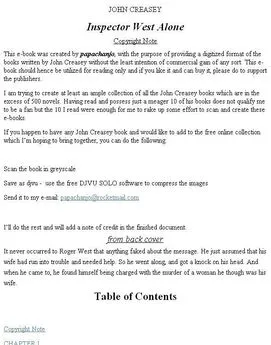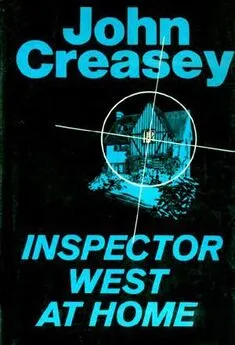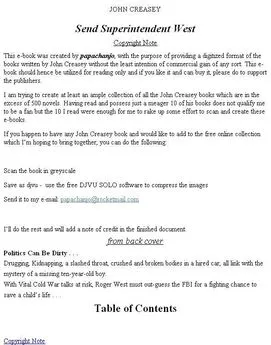John Creasey - Inspector West Alone
- Название:Inspector West Alone
- Автор:
- Жанр:
- Издательство:неизвестно
- Год:неизвестен
- ISBN:нет данных
- Рейтинг:
- Избранное:Добавить в избранное
-
Отзывы:
-
Ваша оценка:
John Creasey - Inspector West Alone краткое содержание
Inspector West Alone - читать онлайн бесплатно полную версию (весь текст целиком)
Интервал:
Закладка:
“I’ll try to look in to-day,” Sloan promised.
He couldn’t settle to work for the next ten minutes. Visiting Janet West always hurt. He was back at the old question, too—whether to say or hint at anything that might raise her hopes.
He had lunch in the canteen. Banister sat on his own at a small table: Banister always sat on his own. He looked morose: he always looked morose. Sloan forgot him.
It was just after four o’clock when he turned into Bell Street, Chelsea. He hadn’t been followed; he didn’t think there was any danger for the rest of the day, they wouldn’t try again so quickly; one accident was an accident, two would make coincidence: coincidences made policemen thoughtful.
He saw two small boys, racing along the street towards him, one hefty and plump and red-faced, the other smaller, thinner, with wavy hair; even from this distance the smaller child’s huge blue eyes were noticeable. Both were laughing fit to burst. A young woman stood at a gate—West’s gate— calling them. They ignored her. They passed the car without looking towards Sloan, the larger boy nearly up to the first and stretching out to grab his grey jersey.
“ Rich- ard ! ” He cried breathlessly. “That’s mine.”
Richard was clutching something that didn’t belong to him as he ran. The young woman called out again and began to hurry after them—and then Richard caught his toe in a ridge between paving stones, and crashed down. There was a moment of breathless silence, followed by a piercing howl. Sloan stopped as the woman hurried past him. She was small, big-breasted, with long, dark hair and a pale face; and her skirts were short. Richard howled wildly. Sloan looked out of the car and saw Scoopy, the elder boy, standing and watching in wide-eyed alarm; and he said:
“It wasn’t my fault, Richard took it.”
The woman said: “You’re a bad boy, Scoopy.”
Richard howled.
Sloan got out of the car and said: “Let me give him a ride, that’ll make him forget it.”
“No, he’s cut his knee,” said the woman, helping Richard up. His face had gone beetroot red, and he opened his mouth wide as he howled. The woman had dark eyes— and a way with children. She picked Richard up, and began to carry him towards the West’s house. “Scoopy, walk nicely behind me. What your mother will say, I don’t know.”
Scoopy defended himself. “Richard took it.”
Richard still had it; a small musical box, the shape of a drum, clutched in his right hand.
They trooped towards the house.
Normally, Janet West’s ears were so sharp that she would have heard that outcry and rushed to see what had caused it. She may have heard it, but hadn’t rushed. Sloan drove oh, and reached the house just in front of the little group. Scoopy took notice of him for the first time, and his big, broad face lit up.
“It’s Mr. Sloan!”
“Hallo, Scoop. What’s all the trouble about?”
“Richard wouldn’t let me have my musical box.” Scoopy knew an ally when he saw one. “It is mine. Daddy bought it for me before he went away.”
“He didn ’ t! ” Richard had stopped crying, and was aggressively indignant. “He didn’t, did he, G’ace? Daddy bought it for us. It was my turn.”
The woman, Grace, put him down. His knee was bleeding freely, and blood gathered at the top of his sock. She bundled both of the boys inside; Sloan followed—and saw Janet coming down the stairs. She didn’t notice him. He stood and watched her, hating the lifelessness in her eyes and face and the dullness of her voice.
“Now what have you been up to?”
“Scoopy——” began Richard.
“Richard——” began Scoopy.
“I’ll look after them, Mrs. West, it only wants a wash and a bandage. Don’t worry.” Grace smiled; she had a charming smile which lit up the whole of her face with a lightness that was almost radiance, and made her look a different woman. None of the radiance touched Janet. She stood aside, and Sloan studied her more closely.
She had often been through difficult, dangerous times, known heart-ache and desperate anxiety when Roger was on a tough assignment; but Sloan had never seen her despairing. Her expression made her look years older—drawn lines at her eyes and mouth spoiled her looks. The eyes which had so readily glowed with cheerfulness were dull. She hadn’t let herself go completely; she was tidily dressed, in a dark-grey frock, and her hair was brushed; she wore it up, Edwardian fashion.
She saw Sloan.
“Bill!” Hope blazed in her eyes—hope without foundation, hope just at seeing him. But it faded swiftly; and she closed her eyes and stood quite still as he went in.
“Hallo, Janet. How are you?”
“I’m all right,” she said. “Come in.” She led the way into the front room—the sitting-room. It was full of Roger; why not? It belonged to Roger. His chair, his pipes, his-
Janet sat down and waved to a chair, then got up.
“Will you have a drink?”
“No, thanks, it’s a bit early.”
“There isn’t any news, is there?”
“No,” said Sloan. “Not news—not hard news, Jan. But I’ve something to tell you that I hope will help a bit.”
She became rigid.
“There’s a line on the Copse Cottage job which we hadn’t found before,” he said. “It may lead to nothing, but at least , it means that Chatworth has agreed that I should spend more time on it. I had a chat with him to-day. He’s prepared to back me up, and although he didn’t say so, he’s with me in believing that the whole business is a grotesque mistake.”
“He hasn’t told me that,” said Janet.
“He won’t, unless he gets hold of something that looks like real evidence. I don’t know that I should tell you this, but at least it’s something to hold on to. I can put some official time into it, now.”
She smiled faintly. “You’ve been wonderful, Bill. You and Mark, I don’t know what I’d have done without you. But—oh, I’ve tried to tell myself that it will work out all right, but if Roger were alive, he’d have got in touch with me, somehow.”
Sloan didn’t speak—but glanced at the door. He heard a slight sound there, and thought he saw the handle turn. Scoopy liked to listen to conversations, but if it had been Scoopy he wouldn’t have come to the door so silently. Imagination ?
Janet said: “Bill, it’s no use, we just have to face the facts. Either Roger is dead or he has had something to do with—crime. That’s the only choice we have. And you know he hasn’t had anything to do with crime, so he must be dead.”
“I can’t believe it.”
“Have you any reason at all for saying that?”
Sloan stood up and took out his cigarettes, moved casually across the room without making a sound and without looking at the door. He said:
“No real reason, Jan. But we know the identity of the girl who was killed at Copse Cottage now, that’s the line that’s opened. I’ve left my matches in my overcoat pocket —won’t be a moment.”
He opened the door.
Grace was moving away, back towards him, heading for the stairs. She didn’t look round. He went to his overcoat and pretended to take matches from it, returned to Janet who was leaning back with her eyes closed. She’d noticed nothing unusual.
Sloan left, three-quarters of an hour afterwards, hearing the boys shouting in their bath, and Grace talking to them cheerfully. Janet was, if anything, a little brighter. He got into his car, waved and drove towards the other end of Bell Street and then to the Chelsea Embankment. He wanted to go back to the Yard.
The woman, Grace——
A car swung out of a side turning towards him. He wasn’t on guard, because he was concentrating on the woman, Grace. But his sixth sense, awareness of danger, worked as he saw the car. He wrenched the wheel. The other was a powerful Buick, big enough to crush his own car like matchwood. He felt the crash, but the Buick only hit the near-side wing. He lost control of the wheel, and his car swerved across the road. The Buick leapt along the Embankment and swung left, over the bridge.
Sloan regained control. People ran towards him. He wasn’t hurt, beyond a bruise or two.
* * * *
Peel was at the Yard when he arrived, and reported that the Chelsea police were looking after the man with the muddy grey Morris, and being ca’ canny. When Sloan told him of the crash, Peel said :
“I told you so.”
Sloan shrugged and said:
“Yes, we’ve got to keep our eyes open all the time. But it’s coming to a head. Peel.”
“Think so?”
“Roger West would call it a hunch. All right, call it a hunch. And here’s another job, to do very carefully. Check on the nurse, Grace Howell, at the West’s home.”
Peel went off.
Sloan began another report; an official one, for which he didn’t need his private note-book. So he didn’t look for it. But he wanted the Copse Cottage murder file, and sent a constable to get it from Records. The man was gone a long time, and Sloan looked up impatiently when he came in, empty-handed.
“What’s the matter—needing a rest?”
“Sorry, sir, but it’s not in its place. The Assistant Commissioner had it earlier to-day—he may still have it.”
Sloan said. “All right, thanks.” He managed without the Copse Cottage file, and went home a little after seven o’clock.
Nothing happened to him on the way. He didn’t tell his wife about the two attempts to run him down.
CHAPTER XX
KENNEDY DEMANDS
IT wasn’t possible for Roger to telephone Pep Morgan that day. He was followed wherever he went, whether by a Yard man or Kennedy’s, he didn’t know. He preferred not to take a chance.
Next day, he wasn’t watched. He didn’t waste time wondering why. He had an appointment in the Strand with a manufacturer of nylon stockings, left before noon, and called Morgan from a kiosk.
* * * *
Morgan said: “Mr. Raymond Hemmingway, twenty-seven, Mountjoy Square.”
“Thanks, Pep,” said Roger.
As the “Pep” came out, he realized the mistake. Not many people knew the private agent as “Pep”.
Morgan appeared not to notice the nickname.
“It’s still dear at fifty pounds, Mr. Brown.”
“I may have something else for you to do later. Not now. Thanks very much.”
Roger stepped out of the kiosk, in a corner of a tobacconist’s shop near Lyme Street, wiped his hot forehead, and went into the street. That had been a bad slip, his worst. By affecting not to notice it, Morgan had shown that it had registered; and Morgan would start thinking about all the people who knew him as “Pep”. They were mostly Yard men or Divisional detectives, who had started to use the name when he had said the police wanted more pep; that was years ago. The danger was that Morgan might tell Sloan, Mark, or Janet.
The risk was real; he couldn’t afford to relax his guard for five seconds on end.
Two or three people were passing; none showed any interest in him. He walked the long way round back to Lyme Street; no one was watching there.
He was paying dearly for the slip, already. Morgan had probably discovered something about Mr. Raymond Hemmingway of 27 Mountjoy Square. Roger should have asked that, and also instructed Morgan to find out all he could about the man.
It wasn’t certain, but it was likely, that Kennedy was really Hemmingway.
Rose was in his office when Roger arrived.
“Hallo,” he said. “Anything for me?”
“I was putting the letters here for signature, sir,” she said. “I’ll go to lunch, now, if there’s nothing you require.”
Читать дальшеИнтервал:
Закладка:










